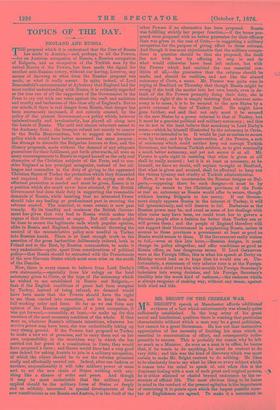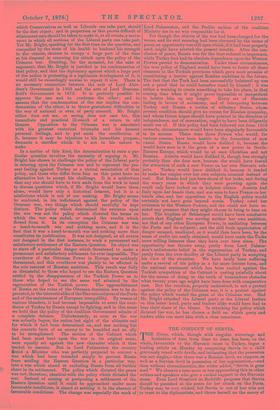HR. BRIGHT ON THE CRIMEAN WAR.
it4R. BRIGHT'S speech at Manchester affords additional 1U. evidence of a fact which unfortunately was already quite sufficiently established. In the long array of his great moral and intellectual qualities there is wanting that particular characteristic without which a man may be a great politician, but cannot be a great Statesman. He has not that instinctive appreciation of the necessity of limiting his aims which is essential to concentration of effort, and consequently indis- pensable to success. This is probably the reason why he left no mark as a Minister. As soon as a man is in office, he learns that, if he wants to do anything, he must be content to do very little ; and this was the kind of discovery which was most certain to make Mr. Bright content to do nothing. He likes to be absolutely free to say what he likes on every subject which it comes into his mind to speak of, and when this is the dominant feeling with a man of such great and original powers, he is either silenced or chafed beyond endurance by the re- straints of official life. The most obvious thing to be borne in mind in the conduct of the present agitation is the importance of restricting it to points upon which the largest possible num- ber of Englishmen are agreed. To make it a movement in
which Conservatives as well as Liberals can take part, should be the first object ; and in proportion as this proves difficult of attainment care should be taken to make it, at all events, a move- ment in which all sections of the Liberal party can take part. Yet Mr. Bright, speaking for the first time on the question, and compelled by the state of his health to husband his strength to the utmost, chooses to occupy a large part of the time at his disposal in renewing his attack upon the policy of the Crimean war. Granting, for the moment, for the sake of argument, that Mr. Bright is justified in his condemnation of that policy, and that the diplomacy against which a large part of the nation is protesting is a legitimate development of it, it would still be exceedingly unwise to repeat it now. There is no necessary connection between the acts of Lord Aber- deen's Government in 1853 and the acts of Lord Beacons- field's Government in 1876. It is perfectly possible to approve the one and to condemn the other ; and to assume that the condemnation of the one implies the con- demnation of the other, is to throw gratuitous difficulties in the way of national or even of party concord. Mr. Bright either does not see, or seeing does not care for, this immediate and practical ill-result of a return to old themes. Opposition to the Crimean war is associated with his greatest oratorical triumphs and his keenest personal feelings, and to put aside the recollection of it, because it may be injurious to his immediate purpose, demands a sacrifice which it is not in his nature to make.
In a matter of this kind, the determination to raise a par- ticular question involves the necessity of arguing it. Mr. Bright has chosen to challenge the policy of the Liberal party in entering upon the Crimean war and to represent the pre- sent feeling against Turkey as a virtual recantation of that policy, and those who differ from him on this point have no alternative but to accept his challenge. It is a misfortune that any one should have to turn aside from the work in hand to discuss questions which, if Mr. Bright would leave them alone, would have only a historical interest, but it is a misfortune which is not of our making. Mr. Bright seems to confound, in his indictment against the policy of the Crimean war, two things which should carefully be kept distinct. The policy which determined the entrance upon the war was not the policy which dictated the terms on which the war was ended, or reaped the results which flowed from it. In its conception the Crimean war was a hand-to-month war and nothing more, and it is the fact that it was a hand-to-mouth war and nothing more that constitutes its justification. It was not designed, at all events not designed in the first instance, to work a permanent and satisfactory settlement of the Eastern Question. Its object was to stave off a particular danger which threatened to make a permanent and satisfactory settlement for ever impossible. The overthrow of the Ottoman Power in Europe was suddenly threatened, and this overthrow was plainly to be effected in the sole interest of Russian ambition. This result was fully as distasteful to those who hoped to see the Eastern Question settled by the disappearance of the Turkish Power as to those who hoped to see the same end attained by the regeneration of the Turkish power. The aggrandisement of Russia on the ruins of the Ottoman dominion was to be de- precated, in the interests alike of the Slavonicsubjects of the Porte and of the maintenance of European tranquillity. By reason of various blunders, it had become impossible to avert the over- throw of Turkey by Russia except by fighting, and in this sense we hold that the policy of the coalition Government admits of a complete defence. Unforbunately, as soon as the war was actually begun, the nation lost sight of the ultimate end for which it had been determined on, and saw nothing but the concrete facts of an enemy to be humbled and an ally to be strengthened. The section of the Cabinet which had been most bent upon the war in its original sense, were equally set against the new character which it thus tended to assume. But in Lord Palmerston the country iikund a Minister who was perfectly prepared to convert a war which had been intended simply to prevent Russia from settling the Eastern Question in a particular way, into a war which aimed at excluding Russia from all further share in its settlement. The policy which dictated the peace was not, therefore, identical with the policy which dictated the war. Instead of aiming at postponing a settlement of the Eastern Question until it could be approached under more favourable conditions, it aimed at settling it in the absence of favourable conditions. The change was especially the work of Lord Palmerston, and the Peelite section of the coalition Ministry are in no way responsible for it.
Yet though the objects of the war had been changed for the worse, and its real meaning had been obscured by the terms of peace, an opportunity was still open which, if it had been properly used, might have averted the present trouble. After the con- clusion of peace, Russia was for the time reduced to impotence, while Turkey had had its absolute dependence upon the Western Powers proved to demonstration. Under these circumstances, the true policy of England would have been to foster all those elements in the Turkish provinces which gave most promise of constituting a barrier against Russian ambition in the future. The fact that the Turk had been successfully bolstered up was not a proof that he could hereafter stand by himself ; it was rather a warning to create something to take his place, in that coming time when it might prove impossible or inexpedient
to bolster him up any longer. Every set of Slavonic feeling in favour of autonomy, and of interposing between Turkey and Russia a cordon of tributary States, whose present condition should give no excuse for Russian sympathy, and whose future hopes should have pointed in the direction of independence, not of annexation ought to have been diligently made use of. If this policy had been followed out from 1856 onwards, circumstances would have been singularly favourable to its success. There were three Powers who would, for various reasons, have been hostile to the formation of new vassal States. Russia would have disliked it, because she would have seen in it the germ of a new power in South- Eastern Europe, which would be at once Christian and not Russian. Austria would have disliked it, though less strongly probably than she does now, because she would have feared the attraction of such a new Power on her own Slavonic sub- jects. Turkey would have disliked it, because it tended to make her empire over her own subjects nominal instead of real. But Russia had just been shorn of her locks, and during the weary years in which they were growing again she could only have looked on in helpless silence. Austria had Italy upon her hands then, and was soon to have France on her hands also, and her opposition to the English policy would certainly not have gone beyond words. Turkey owed her existence to the Western Powers and she could not have re- sisted any pressure that they might choose to bring to bear on her. The trophies of Sebastopol would have been conclusive proofs that England was serving neither her own ambition, nor that of any other European Power, in mediating between the Porte and its subjects ; and the still fresh appreciation of danger escaped, unalloyed, as it would then have been, by the sense of credit too easily obtained, would have made the 'arks more willing listeners than they have ever been since. The opportunity was thrown away, partly from Lord Palmer- ston's unfortunate belief in the regeneration of Turkey, and partly from the over-docility of the Liberal party in accepting his view of the situation. We have lately been suffering under a revival of his policy in a far more intense form, and the national sentiment which has been excited against the Turkish sympathies of the Cabinet is casting painfully about for the means of doing in the teeth of tremendous obstacles what twenty years ago might have been done with comparative ease. But the reaction, properly understood, is not a protest against the policy of the Crimean war, it is a protest against the policy which wasted the gains of the Crimean war. Had Mr. Bright attacked the Liberal party or the Liberal leaders on this latter head, party and leaders alike would have had to bear their share of the blame. In attacking the policy which dictated the war, he has chosen a field on which party and leaders alike can meet him with a clear conscience.



































 Previous page
Previous page